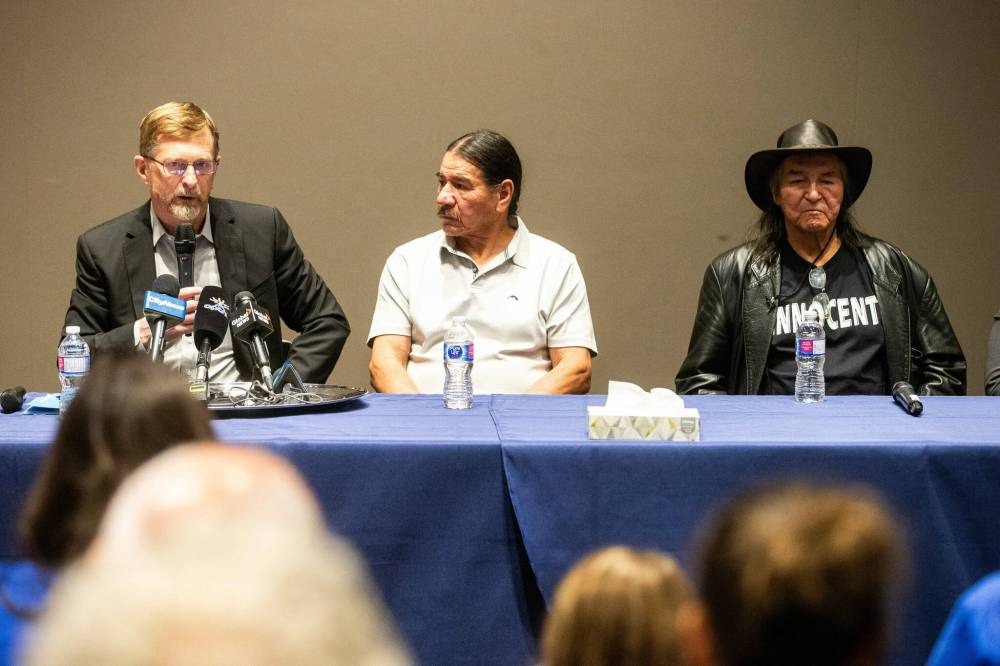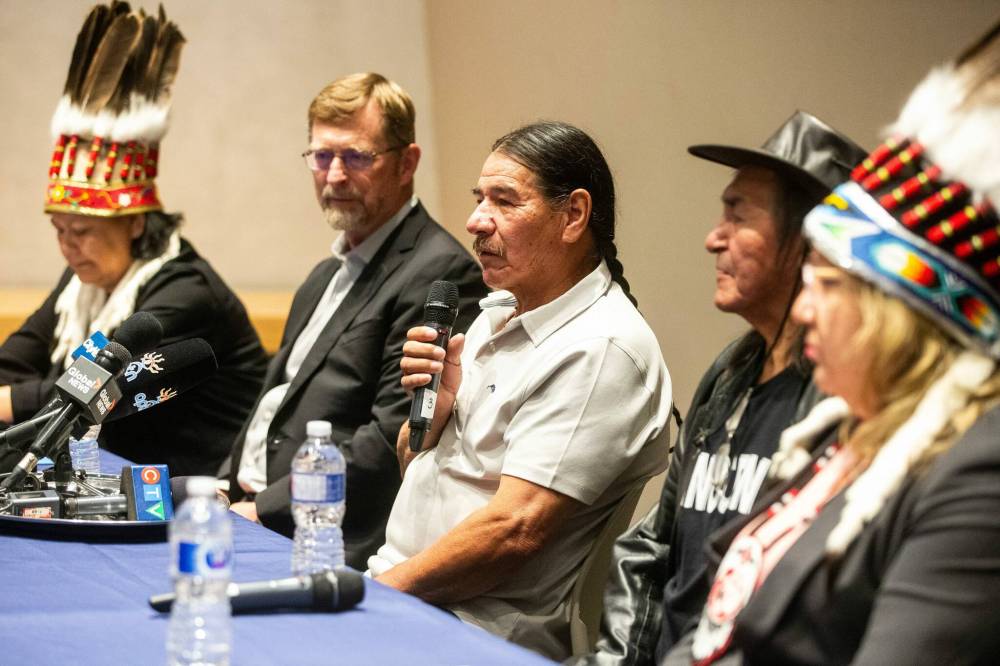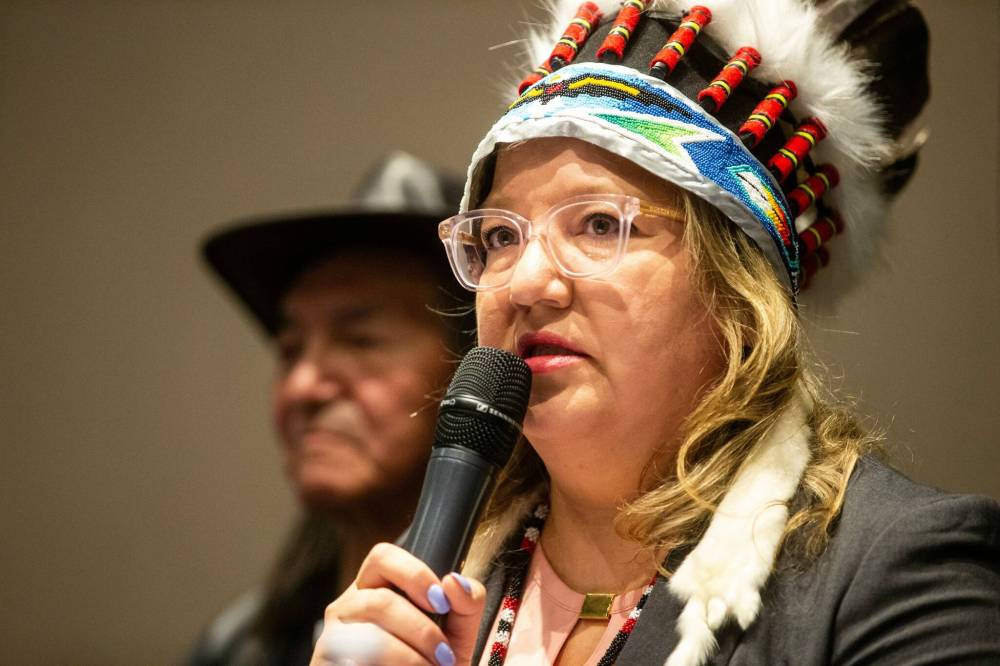‘We have to claim our own freedom’: rallying cry for action on cases of wrongful conviction
Read this article for free:
or
Already have an account? Log in here »
To continue reading, please subscribe:
Monthly Digital Subscription
$0 for the first 4 weeks*
- Enjoy unlimited reading on winnipegfreepress.com
- Read the E-Edition, our digital replica newspaper
- Access News Break, our award-winning app
- Play interactive puzzles
*No charge for 4 weeks then price increases to the regular rate of $19.00 plus GST every four weeks. Offer available to new and qualified returning subscribers only. Cancel any time.
Monthly Digital Subscription
$4.75/week*
- Enjoy unlimited reading on winnipegfreepress.com
- Read the E-Edition, our digital replica newspaper
- Access News Break, our award-winning app
- Play interactive puzzles
*Billed as $19 plus GST every four weeks. Cancel any time.
To continue reading, please subscribe:
Add Free Press access to your Brandon Sun subscription for only an additional
$1 for the first 4 weeks*
*Your next subscription payment will increase by $1.00 and you will be charged $16.99 plus GST for four weeks. After four weeks, your payment will increase to $23.99 plus GST every four weeks.
Read unlimited articles for free today:
or
Already have an account? Log in here »
Hey there, time traveller!
This article was published 19/07/2023 (852 days ago), so information in it may no longer be current.
Two men, who fought for 50 years to prove their innocence after being wrongfully convicted of murder, believe there may be others like them in Manitoba.
“Keep your eyes open. There are other people who are in prison today who are innocent,” Allan John (A.J.) Woodhouse — one of four Indigenous men convicted in the 1973 slaying of Ting Fong Chan, 40 — said Wednesday.
“We have to claim our own freedom. Nobody else is going to do it for us.”
On Tuesday, a Manitoba Court of King’s Bench judge acquitted Woodhouse and Brian Anderson.
Both men had been out of prison for decades, but the court’s move confirmed the truth behind their long-standing proclamations of innocence.
“We have to claim our own freedom. Nobody else is going to do it for us.”–Allan John (A.J.) Woodhouse
Innocence Canada, the non-profit law organization which works to exonerate the wrongly convicted, believes it can also prove the innocence of Russell Woodhouse and Clarence Woodhouse. Russell is dead, while Clarence’s whereabouts are unknown, lawyer James Lockyer said.
On Wednesday, Lockyer and colleague Jerome Kennedy sat alongside Indigenous officials and pleaded for the public’s help in locating Clarence Woodhouse — and other potentially wrongfully convicted Indigenous people.
Part of the evidence that exonerated A.J. Woodhouse and Anderson included testimony from a forensic linguist, who found the speech patterns and language used during their Winnipeg police-recorded confessions were beyond their grasp of the English language, which was limited at the time.
The lawyers believe further review of files will result in similar findings for the other two men convicted in 1974.
“Clarence Woodhouse is alleged to have given a statement to police that is in good English; that is written in sentences… None of the men had interpreters,” Kennedy said. “When Clarence Woodhouse testified at trial… he didn’t understand the language.”
MIKAELA MACKENZIE / WINNIPEG FREE PRESS Innocence Canada lawyer Jerome Kennedy (left), Brian Anderson, and Allan (A.J) Woodhouse, at a press conference at the Canadian Museum for Human Rights on Wednesday.
All four men had moved to Winnipeg from Pinaymootang (formerly Fairford) First Nation and spoke Ojibway.
Innocence Canada has identified “significant concerns” in multiple cases involving Indigenous people across Canada, including several in Manitoba, Kennedy said.
The lawyer declined to comment on which or how many Manitoba cases the organization is reviewing.
Anderson and Woodhouse, who spent 10 and 23 years in prison, respectively, might qualify for financial compensation, although the process is complicated, Kennedy added.
“One of the awful things about (Canada’s) criminal justice system is there is no method for compensation,” he said. “If someone has been wrongly convicted, they are left to deal with the very people who put them in jail… So there has to be negotiations with government.”
MIKAELA MACKENZIE / WINNIPEG FREE PRESS Brian Anderson speaks at a press conference at the Canadian Museum for Human Rights on Wednesday.
Court of King’s Bench Chief Justice Glenn Joyal explicitly proclaimed the men innocent while delivering the acquittal Tuesday, which may help eliminate some of the federal government’s defences should Anderson and Woodhouse pursue damages, Kennedy said.
Manitoba Justice Minister Kelvin Goertzen also issued a statement apologizing to Anderson and Woodhouse.
However, Kennedy stressed the case was not about financial gain. “That issue will be dealt with in the near future, but nothing can give them back the last 50 years.”
The former Crown prosecutor who handled the Chan slaying file, George Dangerfield, has been linked to other wrongful convictions, including those of Thomas Sophonow, James Driskell, Kyle Unger and Frank Ostrowski.
Innocence Canada has been involved in all those overturned rulings.
Sophonow and Driskell received $2.9 million and $4 million, respectively, after their acquittals. Unger settled out of court for an unknown amount. Ostrowski sought compensation, but a judge ruled he took too long to pursue legal action.
Assembly of First Nations regional chief Cindy Woodhouse — who is from Pinaymootang and acknowledged the three Woodhouse brothers involved as “family” — thanked the lawyers for their efforts and commended the recently exonerated men for their resolve.
She echoed calls from the Assembly of Manitoba Chiefs, Congress of Aboriginal Peoples, and Southern Chiefs’ Organization that both men be compensated.
Further, the regional chief asked provincial and federal officials to form an Indigenous-led task force, with the goal of investigating potential cases of wrongful convictions.
On Wednesday, she pointed to the numerous recommendations left unfulfilled by commissions and inquiries over the last three decades, including those made in the final report of the Truth and Reconciliation Commission of Canada.
“We are not short of reports, my friends… We need action.”
MIKAELA MACKENZIE / WINNIPEG FREE PRESS Assembly of First Nations regional chief Cindy Woodhouse echoed calls from the Assembly of Manitoba Chiefs, Congress of Aboriginal Peoples, and Southern Chiefs’ Organization that Brian Anderson, and Allan (A.J) Woodhouse be compensated.
AMC Grand chief Cathy Merrick agreed, describing the overturned convictions as potential “catalysts of change.”
“This is a sign that we can confront the systemic injustice that plagues our society,” she said. “It’s not OK. It’s not a mere blip or a mistake. It’s a pattern of injustice and discrimination that must be addressed.”
In an email statement to the Free Press, Federal Justice Minister David Lametti pointed to Bill C-40, also known as David and Joyce Milgaard’s Law, which seeks to expedite the process by which potential cases of wrongful conviction are reviewed.
“Canada has one of the best justice systems in the world, but the cases of Brian Anderson and Allan Woodhouse remind us that it is not perfect, and when miscarriages of justice occur, the consequences are enormous: for the accused, the victims, and the community,” Lametti said.
“We must make sure that Indigenous peoples, Black and racialized Canadians are able to have their cases reviewed. The current system is failing them.”
tyler.searle@freepress.mb.ca

Tyler Searle is a multimedia producer who writes for the Free Press’s city desk. A graduate of Red River College Polytechnic’s creative communications program, he wrote for the Stonewall Teulon Tribune, Selkirk Record and Express Weekly News before joining the paper in 2022. Read more about Tyler.
Every piece of reporting Tyler produces is reviewed by an editing team before it is posted online or published in print — part of the Free Press‘s tradition, since 1872, of producing reliable independent journalism. Read more about Free Press’s history and mandate, and learn how our newsroom operates.
Our newsroom depends on a growing audience of readers to power our journalism. If you are not a paid reader, please consider becoming a subscriber.
Our newsroom depends on its audience of readers to power our journalism. Thank you for your support.
History
Updated on Wednesday, July 19, 2023 8:19 PM CDT: Adds comment from Federal Justice Minister David Lametti.








